Once Upon A Time In Anatolia (2011) | Dir. Nuri Bilge Ceylan




Once Upon a Time in Anatolia (2011) | dir. Nuri Bilge Ceylan
Cinematography by Gökhan Tiryaki
More Posts from Cine-odyssey-blog and Others



Hansel and Gretel (2007) | dir. Pil-sung Yim | South Korea
Cinematography by Ji-yong Kim
Scorsese’s “Mean Streets” is a true original of our period, a triumph of personal filmmaking. It has its own hallucinatory look; the characters live in the darkness of bars, with lighting and color just this side of lurid. It has its own unsettling, episodic rhythm and a high-charged emotional range, that is dizzyingly sensual. Movies generally work you up to expect the sensual intensities, but here you may be pulled into a high without warning. Violence erupts crazily, too, the way it does in life – so unexpectedly fast that you can’t believe it, and over before you’ve been able to take it in. The whole movie has this effect; it psychs you up to accept everything it shows you. And since the story deepens as it goes along, you’re likely to be openmouthed, trying to rethink what you’ve seen. Its about American life here and now, and it doesn’t look like an American movie, or feel like one. What Scorsese has done with the experience of growing up in New York’s Little Italy has a thicker-textured rot and violence than we have ever had in any American movie, and a riper since of evil.
The picture is stylized without seeming in any way artificial; it is the only movie I’ve ever seen that achieves the effects of Expressionism without the use of distortion. “Mean Streets” never loses touch with the ordinary look of things or with common experience; rather, it puts us in closer touch with the ordinary, the common, by turning a different light on them. Every character, every sound, is rooted in those streets. The back-and-forth talk isn’t little-people empty-funny; it’s a tangle of jeering and joshing, of mutual goading and nerves getting frayed. These boys understand each other too well. No other American gangster-milieu film has had this element of personal obsession; there has never before been a gangster film in which you felt that the director himself was saying “This is my story.” We’re so affected because we know in our bones that Scorsese has walked these streets and has felt what his characters feel. He knows how crime is natural to them.
Scorsese could make poetic drama, rather than melodrama laced with decadence, out of the schlock of shabby experience because he didn’t have to “dive below the polite level, to something nearer to the common life” but had to do something much tougher- descend into himself and bring up what neither he nor anyone else could have known was there. Though he must have suspected. This is a blood thriller in the truest sense.
Pauline Kael



The Virgin Suicides (1999) | dir. Sofia Coppola | USA
Cinematography by Edward Lachman




Only God Forgives (2013) | dir. Nicolas Winding Refn
Cinematography by Larry Smith
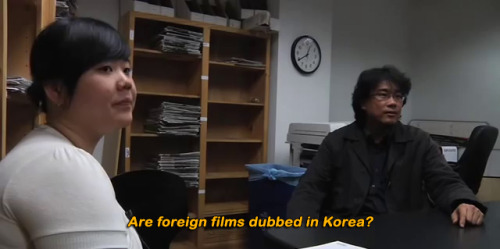
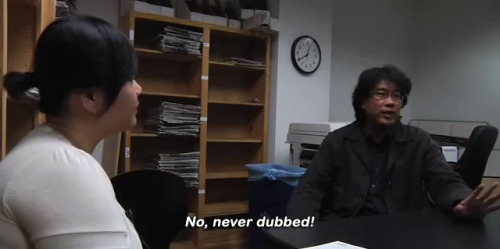

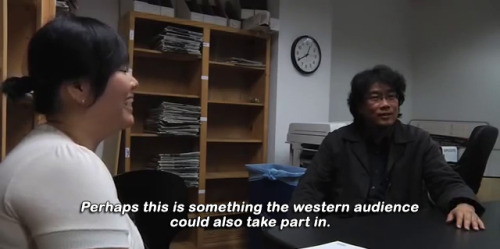
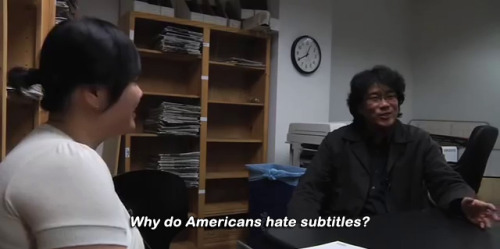
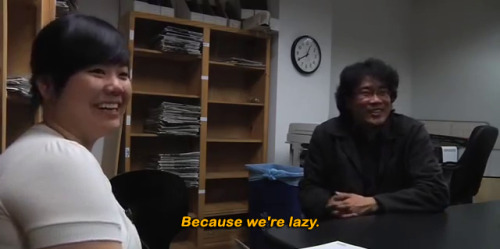

Bong Joon-ho





Only God Forgives (2013) | dir. Nicolas Winding Refn
Director of Photography: Larry Smith

Amelie (2001)
Director: Jean-Pierre Jeunet Cinematography by Bruno Delbonnel



Amélie | dir. Jean-Pierre Jeunet | 2001
DoP: Bruno Delbonnel


Kingdom of Heaven (2005) | dir. Ridley Scott
Saladin & King Baldwin
-
 if-you-were-any-thinner reblogged this · 5 months ago
if-you-were-any-thinner reblogged this · 5 months ago -
 if-you-were-any-thinner liked this · 5 months ago
if-you-were-any-thinner liked this · 5 months ago -
 fxgarneau reblogged this · 6 months ago
fxgarneau reblogged this · 6 months ago -
 brand-upon-the-brain liked this · 3 years ago
brand-upon-the-brain liked this · 3 years ago -
 allweknewisdead reblogged this · 3 years ago
allweknewisdead reblogged this · 3 years ago -
 allweknewisdead liked this · 3 years ago
allweknewisdead liked this · 3 years ago -
 cuibdepiatrasileguma reblogged this · 3 years ago
cuibdepiatrasileguma reblogged this · 3 years ago -
 chryso-poeia liked this · 4 years ago
chryso-poeia liked this · 4 years ago -
 cine-odyssey-blog liked this · 7 years ago
cine-odyssey-blog liked this · 7 years ago -
 cine-odyssey-blog reblogged this · 7 years ago
cine-odyssey-blog reblogged this · 7 years ago -
 4eternal-life liked this · 7 years ago
4eternal-life liked this · 7 years ago -
 susamsamsam liked this · 7 years ago
susamsamsam liked this · 7 years ago -
 firtinayt reblogged this · 7 years ago
firtinayt reblogged this · 7 years ago -
 4eternal-life reblogged this · 7 years ago
4eternal-life reblogged this · 7 years ago

